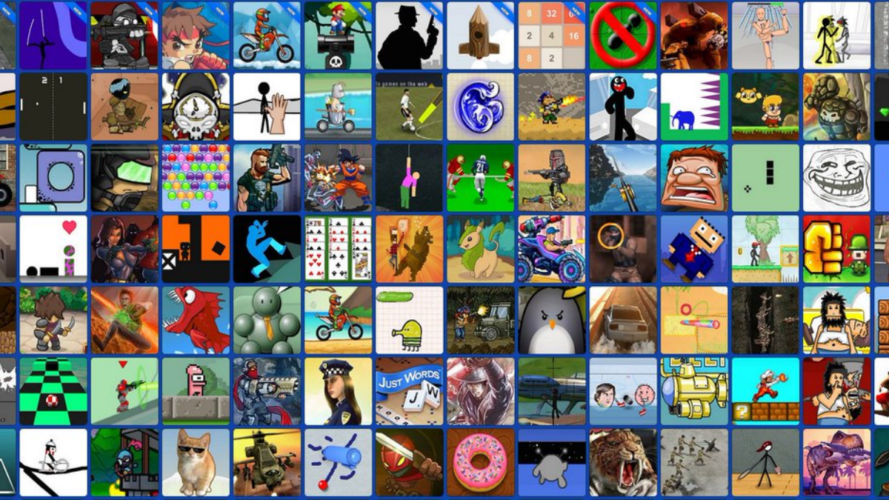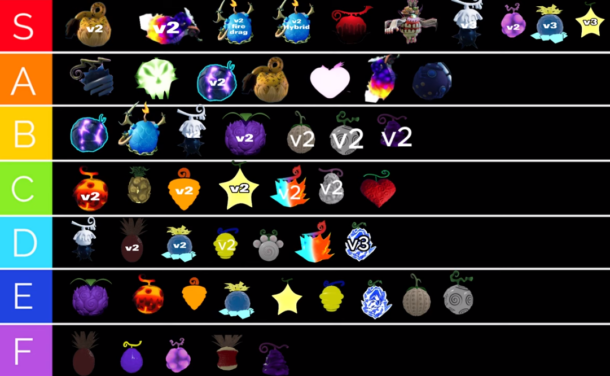Guides
Benefits of Esports Education in Middle and High School
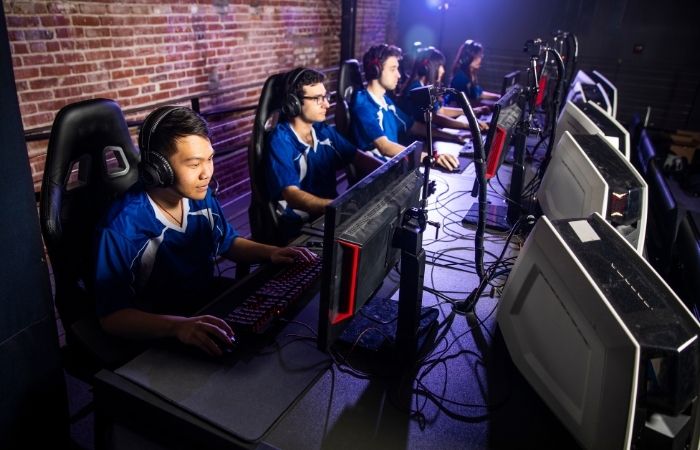
Academic esports teams have become increasingly frequent as the esports industry has evolved as an extracurricular activity. Esports attract students from various walks of life for several reasons, but many are lured in by the opportunity to compete while playing their favorite video games. Many parents and esports coaches have struggled to grasp how esports may serve students’ academic aspirations because it is concentrated on leisure video games that kids play at home.
Even though esports is based on a leisure activity that students generally engage in, esports has several benefits in schools. Kids’ welfare increases when they participate in school activities, and data demonstrates that academic esports enhance students’ overall academic achievement and social-emotional development.
1. Increased Academic Excellence
Young students’ strategic thinking, teamwork, communication, leadership, and performance abilities may benefit from esports. There are various advantages to video gaming for the brain, including evidence that it can increase visual perception, memory, attention, and focus. These abilities can benefit kids in their gaming and their overall well-being and academic achievement. In the same way that being a member of an esports team may enhance students’ time management and task completion in school, being a part of an esports team can help students’ time management and task completion in school.
2. More Inclination Towards STEM fields
Esports players have been proven to have a more substantial interest in STEM (Science, Technology, Engineering, and Math) courses and have higher average GPAs. Esports allows children to interact with their classmates and schools. Students may engage with STEM principles through esports, which may encourage them to follow STEM paths in college and their careers.
3. Tournaments that Offer Scholarships for College Students
Sports and peer networks define academic esports, distinguishing between esports and at-home gaming. Kids play in virtual and in-person tournaments with their teammates, with students from schools and the same district, and as far as the other side of the globe! Through their shared love of gaming, esports events bring together students from many backgrounds and cultures. Academic esports may even help kids get into college, with competitions awarding significant scholarships and colleges seeking students to join their esports teams.
4. Future Job Market
Students who play video games become more competent and more employable in various fields, including medicine, engineering, aviation, remote piloting, computer science, and others.
Students, for example, learn mathematical skills through their gameplay metrics, combining data analysis and arithmetic to develop a more practical approach in the future. Furthermore, esports contribute significantly to their technological confidence. Many youngsters will learn about computers, programming, and even video game development. Some students might go so far as to learn how to construct their PCs to produce the most excellent gaming equipment possible.
5. Increased Problem Solving
According to research, youngsters who actively participate in esports have a greater chance of navigating through complicated psychological challenges than those who do not. Improved visual acuity and attentiveness with basic visual processing and executive function are a few signs to observe in them. Students’ problem-solving and strategy-making are two skills that are developed.
Conclusion
These are various advantages of academic esports, so many middle schools are starting esports teams. It’s easy to create an esports team, and it’s a terrific complement to your school’s extracurricular activities.
Guides
A One Piece Game Fruit Tier List [Complete Guide]

The world of One Piece is a vast and colorful universe filled with adventure, mystery, and some of the most unique powers known as Devil Fruits. These mystical fruits grant their consumers extraordinary abilities, ranging from elemental manipulation to transforming into mythical creatures. With such a diverse array of powers, it’s only natural for fans of the franchise to speculate and debate which Devil Fruits reign supreme.
In this comprehensive guide, we’ll delve into the world of One Piece and construct a tier list ranking these Devil Fruits based on their effectiveness in gameplay within One Piece video games.
About Devil Fruits
Before we get into the tier list, it’s important that we understand the basics of Devil Fruits in the One Piece universe. Devil Fruits are mystical fruits found throughout the world that grant whoever consumes them extraordinary powers at the cost of their ability to swim. There are three main types of Devil Fruits: Paramecia, Zoan, and Logia.
- Paramecia: Paramecia Devil Fruits grant users a wide range of superhuman abilities that do not fall under the other two categories. These abilities can vary greatly, from transforming parts of the body to manipulating the environment around them.
- Zoan: Zoan Devil Fruits allow users to transform into a specific animal species or a hybrid form combining human and animal traits. These fruits offer enhanced physical abilities and often come with unique combat capabilities.
- Logia: Logia Devil Fruits grant users the power to transform into a specific element or substance, granting intangibility and the ability to manipulate their respective element at will. Logia users are notoriously difficult to defeat due to their ability to reform from attacks.
With this understanding in mind, let’s explore the tier list for Devil Fruits in One Piece video games, considering factors such as combat effectiveness, versatility, and overall utility.
Also Read: 10 Best BGMI Player in India 2024
List Of The Tier’s In One Piece
S-Tier
Devil Fruits in the S-Tier are considered the most powerful and versatile, providing users with exceptional abilities that can turn the tide of battles and challenges.
- Gura Gura no Mi (Tremor-Tremor Fruit)
- Game Representation: One Piece: Pirate Warriors 4
- Description: This Logia-type Devil Fruit grants the user the ability to create devastating shockwaves, capable of causing earthquakes and tsunamis. In the game, players can wreak havoc on enemies and the environment alike, making it a top-tier choice for combat and crowd control.
- Ope Ope no Mi (Op-Op Fruit)

- Game Representation: One Piece: Burning Blood
- Description: The Paramecia-type Ope Ope no Mi grants its user the ability to manipulate space, allowing them to perform surgical operations without causing harm. In the game, this fruit provides unparalleled utility, with abilities such as teleportation and creating impenetrable barriers, making it a formidable choice for both offense and defense.
Also Read: How to Increase Loyalty in Bannerlord: Mount & Blade 2
- Yami Yami no Mi (Dark-Dark Fruit)
- Game Representation: One Piece: Unlimited World Red
- Description: The Logia-type Yami Yami no Mi grants the user control over darkness itself, enabling them to absorb and nullify attacks. In the game, this Devil Fruit grants incredible offensive and defensive capabilities, as well as the ability to crush opponents with the gravitational force of darkness, earning its place in the S-Tier.
- Mera Mera no Mi (Flame-Flame Fruit)
- Game Representation: One Piece: Pirate Warriors 3
- Description: This Logia-type Devil Fruit allows the user to generate and control flames at will. In the game, players can unleash torrents of fire upon enemies, creating devastating infernos and incinerating everything in their path. Its offensive prowess and versatility make it a staple choice for players seeking powerful abilities.
A-Tier
Devil Fruits in the A-Tier offer substantial advantages in gameplay, providing users with formidable abilities that excel in various situations.
- Hie Hie no Mi (Ice-Ice Fruit)
- Game Representation: One Piece: Pirate Warriors 2
- Description: The Logia-type Hie Hie no Mi grants the user control over ice, allowing them to freeze opponents and manipulate frozen structures. In the game, this Devil Fruit provides both offensive and defensive capabilities, with abilities such as creating ice barriers and launching icy projectiles.
Also Read: How Old is Reyna: All Valorant Agent’s Age, Name, & More
- Gomu Gomu no Mi (Gum-Gum Fruit)
- Game Representation: One Piece: Unlimited Adventure
- Description: The Paramecia-type Gomu Gomu no Mi grants its user rubber-like properties, enabling them to stretch their body and deliver powerful punches and kicks. In the game, players can utilize the fruit’s elasticity to traverse terrain and unleash devastating melee attacks, making it a versatile and iconic choice.
- Nikyu Nikyu no Mi (Paw-Paw Fruit)
- Game Representation: One Piece: Pirate Warriors 4
- Description: The Paramecia-type Nikyu Nikyu no Mi grants its user the ability to repel anything they touch, including physical attacks and even pain itself. In the game, this Devil Fruit provides exceptional defensive capabilities, allowing players to deflect enemy assaults and counterattack with precision, making it a valuable asset in battles.
- Goro Goro no Mi (Rumble-Rumble Fruit)
- Game Representation: One Piece: Burning Blood
- Description: This Logia-type Devil Fruit grants the user control over electricity, allowing them to unleash devastating lightning-based attacks. In the game, players can electrocute opponents and create electrified barriers, offering both offensive firepower and defensive capabilities that can shock and incapacitate foes.
Also Read: Redo of Healer Season 2: Release Date, Cast, And Character
B-Tier
Devil Fruits in the B-Tier offer solid abilities that can be effective in certain situations but may lack the versatility or power of higher-tiered fruits.
- Bomu Bomu no Mi (Bomb-Bomb Fruit)
- Game Representation: One Piece: Grand Adventure
- Description: The Paramecia-type Bomu Bomu no Mi grants its user the ability to turn any part of their body into a bomb, detonating at will. In the game, players can wreak havoc with explosive attacks, damaging enemies and obstacles alike, albeit with some risk of self-inflicted harm.
- Hana Hana no Mi (Flower-Flower Fruit)
- Game Representation: One Piece: Pirate Warriors 3
- Description: The Paramecia-type Hana Hana no Mi allows its user to sprout multiple limbs from any surface, granting enhanced mobility and combat capabilities. In the game, players can overwhelm opponents with a flurry of attacks from various angles, though the fruit’s effectiveness may be limited in certain scenarios.
- Bara Bara no Mi (Chop-Chop Fruit)
- Game Representation: One Piece: Grand Battle! 2
- Description: The Paramecia-type Bara Bara no Mi grants its user the ability to disassemble their body into floating pieces, granting immunity to slashing attacks and allowing for creative maneuverability. In the game, players can evade attacks and surprise opponents with unexpected movements, though the fruit’s offensive capabilities may be somewhat lacking.
- Hito Hito no Mi, Model: Daibutsu (Human-Human Fruit, Model: Giant Buddha)
- Game Representation: One Piece: Pirate Warriors 2
- Description: This Zoan-type Devil Fruit allows the user to transform into a giant golden Buddha, granting immense strength and durability. In the game, players can unleash devastating melee attacks and withstand considerable punishment, making it a formidable choice for frontline combat.
Also Read: Free Fire Auto Headshot Hack
C-Tier
Devil Fruits in the C-Tier offer limited utility or are overshadowed by more powerful options, making them less desirable choices for players seeking optimal gameplay.
- Sube Sube no Mi (Slip-Slip Fruit)
- Game Representation: One Piece: Pirate Warriors
- Description: The Paramecia-type Sube Sube no Mi grants its user the ability to make their body incredibly slippery, causing attacks to slide off harmlessly. In the game, while this fruit provides some defensive benefits, its overall usefulness is limited compared to other Devil Fruits with more potent abilities.
- Noro Noro no Mi (Slow-Slow Fruit)
- Game Representation: One Piece: Unlimited Cruise SP
- Description: The Paramecia-type Noro Noro no Mi allows its user to emit light that slows down anything it touches. In the game, players can use this ability to hinder opponents’ movements temporarily, though its effectiveness may be situational, especially against faster adversaries.
- Doru Doru no Mi (Wax-Wax Fruit)
- Game Representation: One Piece: Grand Battle! Rush
- Description: The Paramecia-type Doru Doru no Mi grants its user the ability to generate and manipulate wax. In the game, players can create barriers and immobilize opponents with sticky wax, though the fruit’s utility may be limited compared to more versatile options.
Also Read: Training Slayer Mod APK Download (Latest V50.0) For Android
- Bane Bane no Mi (Spring-Spring Fruit)
- Game Representation: One Piece: Pirates’ Carnival
- Description: The Paramecia-type Bane Bane no Mi allows its user to transform their body into springs, granting enhanced agility and the ability to launch powerful spring-loaded attacks. In the game, while this Devil Fruit offers some unique combat maneuvers, its overall effectiveness may be overshadowed by other options in higher tiers.
D-Tier
Devil Fruits in the D-Tier possess abilities that are generally considered weaker or less impactful compared to higher-tiered fruits.
- Nui Nui no Mi (Sewing-Sewing Fruit)
- Game Representation: One Piece: Gigant Battle
- Description: The Paramecia-type Nui Nui no Mi grants its user the ability to sew anything together, including wounds and objects. In the game, while this fruit may provide utility in certain situations, its combat effectiveness is limited compared to other Devil Fruits with more offensive capabilities.
- Jake Jake no Mi (Jacket-Jacket Fruit)
- Game Representation: One Piece: Grand Adventure
- Description: The Paramecia-type Jake Jake no Mi grants its user the ability to turn their body into a living jacket, allowing them to possess and control other beings. In the game, while this fruit may offer unique strategic opportunities, its overall usefulness in combat may be limited compared to other Devil Fruits.
- Ushi Ushi no Mi, Model: Bison (Ox-Ox Fruit, Model: Bison)
- Game Representation: One Piece: Grand Battle! Rush
- Description: This Zoan-type Devil Fruit allows the user to transform into a bison, granting enhanced strength and durability. In the game, while the fruit provides some combat benefits, its effectiveness may be overshadowed by other Zoan-type Devil Fruits with more impressive transformations.
- Awa Awa no Mi (Bubble-Bubble Fruit)
- Game Representation: One Piece: Pirate Warriors
- Description: The Paramecia-type Awa Awa no Mi grants its user the ability to create and control bubbles. In the game, while this fruit may have some utility for hindering opponents’ movements, its offensive capabilities are generally considered weaker compared to other Devil Fruits.
E-Tier
Devil Fruits in the E-Tier are considered the least effective or desirable options, possessing abilities that offer minimal impact or are overshadowed by superior alternatives.
- Noko Noko no Mi (Scoop-Scoop Fruit)
- Game Representation: One Piece: Unlimited Adventure
- Description: The Paramecia-type Noko Noko no Mi grants its user the ability to scoop up and consume objects or individuals. In the game, while this fruit may have niche applications, its overall usefulness in combat or gameplay is minimal compared to other Devil Fruits with more versatile abilities.
- Kama Kama no Mi (Sickle-Sickle Fruit)
- Game Representation: One Piece: Grand Battle! 2
- Description: The Paramecia-type Kama Kama no Mi grants its user the ability to transform their limbs into sickles. In the game, while this fruit may provide some offensive capabilities, its effectiveness in combat may be limited compared to other Devil Fruits with more potent abilities.
- Toge Toge no Mi (Spike-Spike Fruit)
- Game Representation: One Piece: Pirates’ Carnival
- Description: The Paramecia-type Toge Toge no Mi grants its user the ability to produce spikes from their body. In the game, while this fruit may offer some defensive capabilities, its overall utility and effectiveness in gameplay are considered minimal compared to other Devil Fruits.
- Mini Mini no Mi (Mini-Mini Fruit)
- Game Representation: One Piece: Gigant Battle
- Description: The Paramecia-type Mini Mini no Mi grants its user the ability to shrink their body to a miniature size. In the game, while this fruit may offer some strategic advantages for evasion or infiltration, its combat capabilities are generally considered weak compared to other Devil Fruits.
Also Read: How Old is Mitsuri: Every Main Characters Age, Birthday & Height
Conclusion
In the world of One Piece video games, the choice of Devil Fruit can significantly impact gameplay, offering a wide range of abilities and strategic advantages. While some Devil Fruits reign supreme in terms of power and versatility, others may offer unique play styles or support roles. By understanding the strengths and weaknesses of each Devil Fruit, players can make informed decisions and strategize effectively in their quest for victory within the virtual world of One Piece. Whether you prefer devastating elemental attacks or cunning tactical maneuvers, there’s a Devil Fruit out there waiting to be discovered and mastered.
Guides
Free Fire Auto Headshot Hack

Free Fire is a most played battle royale game with unlimited health, headshot, diamonds, and aimbot. published by Garena International for Android and iOS. he main object of the Free Fire
It has two main game modes: Battle royale and claSh squad. In Battle Royale, 50 players are dropped onto an island and must fight to be the last one standing. Clash Squad is a team-based mode where two teams of 4 players fight each other in a best-of-5 match. Free Fire features a variety of weapons, items, and vehicles that players can use to survive. The game also has a system of playable characters with unique skills. In this game you land with other 49 players , and find a gun. After that you have to kill every player in order to survive till the end. It was first launched in 2017.

Some Characters of free fire game:
- D-BEE- Street dancer and music artist
- Xayne- She is an athlete
- Skyler: He is the CEO of an entertainment company
- Chrono: A bounty hunter from another universe
- K: He is a jiu-jitsu expert
- Jai: Swat is military
- Luqueta: He is a football player
- Hayato: A legendary samurai
- Moco: Hacker
- Steffie: She is a graffiti artist
- Misha: He is a racer
- Andrew: It’s the police
- Kelly: Most popular girl in the school
- Laura: Special agent
- Rafael: He is a hit man
- Alok: World famous DJ
Also Read: 10 Best BGMI Player in India 2024
Tips and tricks to ace Free fire game:

- Scope in before pressing the fire button
- Adjust weapon sensitivity settings
- Knowledge of where to put the crosshair
- Make a smart HUD layout
- Practice headshots
Guns play the most important role in Free fire games.
- Woodpecker
- SKS/SVD
- M500
- Desert Eagle
- M1887
Also Read: How to Increase Loyalty in Bannerlord: Mount & Blade 2
Free fire game hacks
- Diamond Hack: It helps players better manage and grow their diamonds which improve game performance.
- Wall Hack: It allows the hackers to spot and shoot at the players through rigid walls.Hackers can pass through that wall.
- Aim Hack: It helps players use to decrease the risk of getting caught, players can use the automatic aim from the head in order to save themselves
- Speed and Jump hacks: It enhances their movement and sprinting velocity.
FAQs
1. Is Garena free fire apk safe to download?
It has no viruses, spyware, malware worms and thus it is safe to download the game. You can install it without any problem
2. Is Garena free fire apk free?
Yes it is 100% free of cost and you can download the game without paying anything.
3. How is Free Fire played?
Players can control a character in a third person perspective and use a joystick to move
4. Which character was carried by players the most in the past year in Free Fire?
Alok
5. What was the weapon with the most kills?
MP40
Also Read: How Old is Reyna: All Valorant Agent’s Age, Name, & More
Conclusion
It is a great modified game. It has many qualities. When you download it and start to play, you will easily know all things about this game. It provides you with the features like unlimited health, Auto Headshot, diamonds, and Aimbot. All the characters of this game are already unlocked. You just need to select them and play with them. In conclusion, Auto Headshot Panel is an amazing FF injector APK with great features which allows its users to get all the premium features for free. The game does not leave its players disappointed in the busy battlefield, as its advanced weapons and powerful avatars boost the morale and spirit of the users even more.
Features
Razer Gold for Less: Insider Tips for Buying Discounted Gift Cards on BuySellVouchers

Razer Gold is a virtual currency that is offered by the Razer company. You can use Razer Gold to purchase new games and in-game content. Usage Razer Gold gift cards give you a better bang for your buck and when you top up your Razer Gold, you get Razer Silver in return which you can exchange for even more rewards.
Every buyer loves a good discount no matter what product it is you’re buying. The same goes for buying discounted Razer Gold gift cards. Gamers tend to rely on gift cards a lot to make their gaming purchases. By using discounted gift cards, you can not only make your transaction almost instantly but also do it cost-effectively.
In this article, we’ll tell you all about buying discounted Razer Gold gift cards and how to utilize them in order to reap the maximum profits possible as well as addressing some common concerns and providing tips to make a smooth transaction.
Understanding Razer Gold and BuySellVouchers
Razer Gold is your all-in-one currency to purchase various games and in-game content from the Razer website. Razer Gold can be obtained by purchasing it directly or redeeming Razer Gold gift cards. Using Razer Gold vouchers is a much cheaper and convenient way to carry out all your gaming transactions.
Buying Razer Gold gift cards through BuySellVouchers
If you want to top up your Razer account, you can simply purchase a Razer Gold gift card. The smart choice would be to get a discounted Razer Gold gift card but where can a person get one? BuySellVouchers of course. BuySellVouchers has a huge category of discounted Razer Gold gift cards so you can browse and buy the one you deem best.
Discounted gift cards obviously save you money. So why not use them? By using discounted gift cards, you can purchase any game you want at a much cheaper price than buying it directly from official stores.
Why Choose BuySellVouchers for Razer Gold PINs?
Discounted Gift Cards
There are many reasons to choose BuySellVouchers for buying and selling gift cards over other platforms. One of the main reasons is discounts, which can reach up to 35% of the gift card’s nominal value. It has the best prices and special discounts across most of its products which makes BuySellVouchers a no-brainer if you want to purchase cheap gift cards. BuySellVouchers also has support for various payment methods including crypto such as USDT, BTC, USDC, and e-wallets like Maya and GrabPay (at the Official Store).
Razer Gold gift card giveaways
Every other week, BuySellVouchers provides gift card giveaways. Since users have the opportunity to select their preferred gift card platform for the giveaways, Razer Gold gift cards are frequently chosen. Each giveaway typically offers 10 gift cards, each valued at $10.
Comparison with other platforms offering Razer Gold gift cards
If we compare the price of the cheapest 10 USD Razer Gold gift card among some other popular marketplaces, we can see that BuySellVouchers offers the lowest price of 9.06 USD.
Kinguin.net has a price of 11.75 USD:
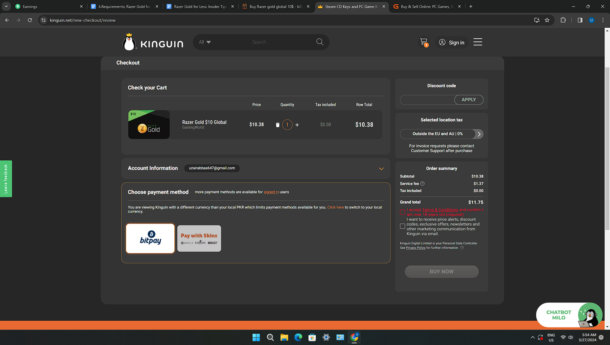
G2A.com has a price of 10.19 USD:

User reviews highlighting positive experiences with BuySellVouchers
If you’re concerned about the legitness of the BuySellVouchers platform, then you can look at the response of past customers of the platform to determine its legitness. A few reviews about the Buysellvouchers marketplace on Trustpilot.com are included below.


Insider Tips for Maximizing Savings
Tip #1: Timing is Key
If you want to obtain the best deals and discounts on BuySellVouchers, then timing is everything. Sellers may offer big discounts during special promotional events or during holidays. During these times, be sure to check prices regularly.
Tip #2: Explore Different Sellers
When you want to buy a gift card, be sure to explore different sellers and compare the prices among them. Your sentence is mostly correct, but it can be improved for clarity and consistency. Choose the seller that offers the lowest price and has a good reputation (high seller rating). You can evaluate a seller’s performance by looking at his reviews and successful sales history.
Tip #3: Take Advantage of Promotions
From time to time, there may be ongoing promotions on the BuySellVouchers or Razer platform. During these events, you can generally save even more money due to bigger discounts.
Tip #4: Bundle Deals
Some sellers on the platform also offer discounts for bulk purchases. These packages will save you more money than if you buy gift cards one by one. The bigger your order is, the more you can save. There are sellers who sell gift cards in bulk at very good prices.
Tip #5: Monitor Price Trends
Gift card prices can fluctuate from time to time. The product that you want to buy today may not be offered at the same price tomorrow. In such an event, your best option would be to wait for the price to go down again. To monitor the prices, you should be kept updated on the BuySellVouchers platform whenever you can.
Ensuring a Smooth Transaction
Account setup
To create an account on BuySellVouchers, click on the Register button at the top.
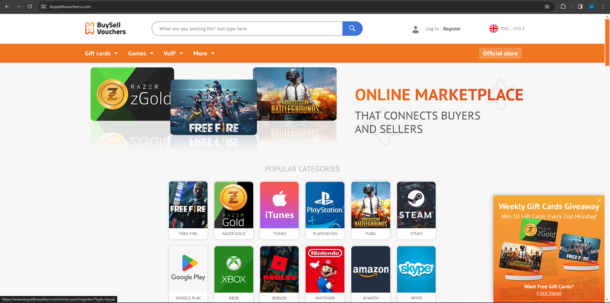
After that, you can either Sign Up using your existing Google gmail account or alternatively create your own unique BuySellVouchers account by entering a valid e-mail address, a username and password.

After you input your details and click on the Sign Up button, you will then be asked to verify your e-mail by clicking on the link you just received in your e-mail address. Do that and you’re all good to go.
A step-by-step guide to purchasing Razer Gold gift cards on BuySellVouchers
To browse all available Razer Gold gift cards on BuySellVouchers, you can either use the search function or browse the Razor Gold category.
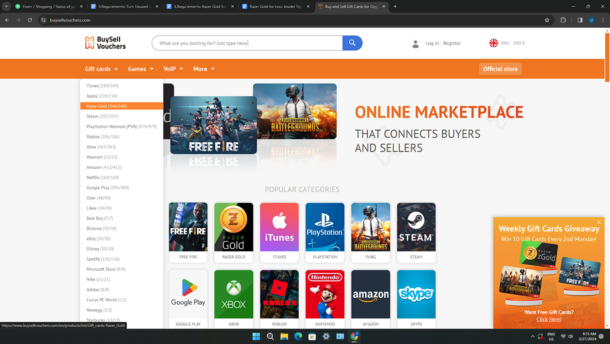
Choose the product that you want to buy and then after that, click on the Buy Now button. Select your desired payment method, enter your email address where you want to receive your product and then click on the Buy button.
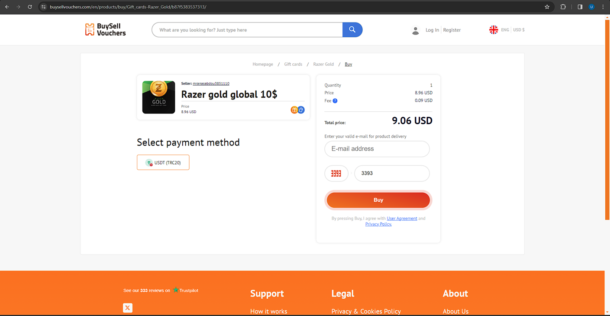
Wait for your order to be processed. After that, the gift card code will be delivered to you.
Tips for verifying the authenticity and value of gift card listings
To verify the authenticity and value of gift card listings, you can look at the seller’s reviews and feedback to determine if he’s a legit seller or not. If the reviews are generally positive, then you can go ahead and buy from him. If reviews are negative, you should tend to avoid him.Safety measures and precautions for buyers to avoid scams or fraud
To find the sellers with the most positive feedback, you can use the filter function on BuySellVouchers which will bring the sellers with the best feedback in descending order. Each seller has a seller level that determines their success with the platform. By buying from the top-rated sellers, there is nearly zero chance for you to get scammed. If you want 100% risk free purchases you can buy your gift cards from the Official BuySellVouchers Store where every product is offered by the official seller of the platform.Real-Life Success StoriesTestimonials from gamers who have purchased Razor Gold gift cards from BuySellVouchersBelow, you’ll find the feedback of a few people who have successfully purchased a $100 Razer Gold gift card from BuySellVouchers.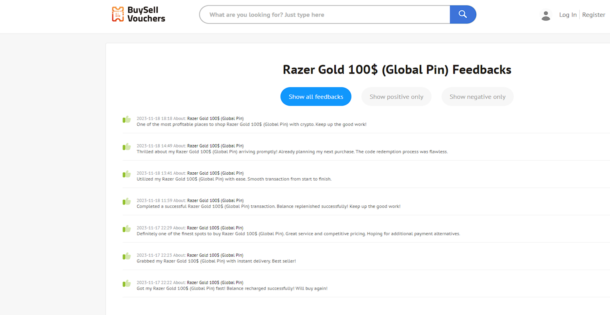
How buying and using discounted gift cards has helped people with financial concerns
Buying discounted Razer Gold gift cards allow people to purchase games that they weren’t able to previously due to financial issues. Using discounted Razer Gold gift cards allows you to buy games at a very cheap price and also get Razer Silver in return which you can redeem for even more rewards.
Addressing Common Concerns
Addressing skepticism or doubts about the legitimacy of discounted gift cards
Before anyone buys a discounted gift card for the first time, they have many doubts in mind. They wonder about the possibility of being scammed, but we can assure you that if you buy your discounted gift cards from BuySellVouchers Official Store, you will never face such a problem.
Clarifying buyer protection measures and recourse in case of issues
In case you face issues with your seller regarding your purchases, you can either contact him to discuss your issue and get it resolved. If the seller doesn’t reply or refuses to resolve your issue, you can contact the BuySellVouchers customer support. If you haven’t received your product, you might be able to get a refund as well.
Providing guidance on compliance with terms of use for Razer Gold gift cards
To prevent any future issues or misconceptions. Be sure to fully comply with the Razer Gold terms of service. Upon redeeming a Razor Gold gift card, the gift card balance will be added to your account and it must be used within one year. However, you are exempt from this if you live in certain areas where this is prevented by law.
Conclusion
Razer Gold gift cards allow you to top up your account and purchase games and in-game content in a fast and convenient way. If you look for cheap Razer Gold gift cards, then BuySellVouchers marketplace is the right place to go. So, if your budget is the main factor stopping you from buying gift cards, visit BuySellVouchers to get the most out of your budget.
-

 Guides4 years ago
Guides4 years ago6 Proven Ways to Get more Instagram Likes on your Business Account
-

 Guides1 month ago
Guides1 month agoExplore 15 Most Popular Poki Games
-

 Mainstream9 years ago
Mainstream9 years agoBioWare: Mass Effect 4 to Benefit From Dropping Last-Gen, Will Not Share Template With Dragon Age: Inquisition
-

 Other3 years ago
Other3 years agoHow to Improve Your Research Skills on the Internet
-
Mainstream15 years ago
The Sims 3: How to Correct the Disc Authentication Error
-
Social Games14 years ago
Backyard Monsters Tips, Tricks & Strategy
-

 Guides1 year ago
Guides1 year agoThomas Freelance: A Company That Knows What It Takes To Do Good Business
-

 Guides1 year ago
Guides1 year agoGan Rubik’s Cube vs. Traditional Rubik’s Cube: Key Differences and Advantages

